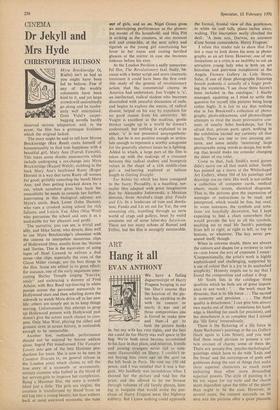CINEMA
Dr Jekyll and Mrs Hyde
CHRISTOPHER HUDSON
The story might be said to tell how Myron Breckinridge (Rex Reed) cures himself of homosexuality to find true happiness with a beautiful girl, Mary Ann (Farrah Fawcett). This takes some drastic manoeuvres which include undergoing a sex-change into Myra Breckinridge (Raquel Welch), stabbing in the back Mary Ann's boyfriend Rusty (Roger Herren) in a way that turns Rusty off women for good; girlishly consoling the bereft Mary Ann; and then getting knocked down by a car, which somehow gives him back the masculinity he needs to console her further. Intervening in this biological odyssey are Myra's uncle, Buck Loner (John Huston), who runs a crooked acting school for rich failures, and Leticia Van Allen (Mae West) who patronises 'the school, and uses it as a stud-stable for her pleasure and profit.
The narrative, you can see, is trivial and silly, and Mike Same, who directs, does well to use Myra Breckinridge's obsession with the cinema to interpolate numerous clips of Hollywood films, mostly from the 'thirties and 'forties. This is the equivalent of using
tapes of Noel Coward to enliven a dud revue—the clips, especially the ones of the Glenn Miller vintage, are the best things in the film. Some are edited in to great effect; for instance, one of the early sequences inter- cutting Shirley Temple singing 'S-m-i-l-e, smile!' and embracing a dummy of Fred Astaire, with Rex Reed tap-dancing in white pumps across the pavement memorials to Hollywood stars and then whirling down the sidewalk to watch Myra drive off to her new life; others are simply put in to keep things moving. Unfortunately this attempt to prop up Hollywood present with Hollywood past doesn't give the actors much chance to com- pete. Only Mae West, playing the oldest and grossest siren in screen history, is outlandish enough to be memorable.
Another fine, outlandish performance should not be enjoyed by horror addicts
alone. Ingrid Pitt transformed The Vampire Lovers into one of the best Hammer pro- ductions for years. She is now to be seen in- Countess Dracula (x, on general release in
the London area) which claims to tell the true story of a sixteenth- or seventeenth- century countess who bathed in the blood of her servant-girls to improve her complexion. Being a Hammer film, the story is embell- ished just a little. The girls are virgins; the countess is transformed by blood' from an old hag into a young beauty; her face withers back at most awkward moments; she runs
out of girls, and so on. Nigel Green gives an entertaining performance as the glower-
ing master of the household; and Miss Pitt is striking as the countess, at one moment evil and crone-like, at the next sultry and tigerish as the young girl entertaining her lover in her room and casting terrified glances at the mirror in case she becomes hideous before his eyes.
At the London Pavilion a sadly unsuccess- ful film, The Revolutionary (An). Sadly, be- cause with a better script and more cinematic treatment it could have been the first cred- ible study of the genesis of revolutionary action that the commercial cinema in America had undertaken. Jon Voight is 'A', an intellectual, radical student who becomes dissatisfied with peaceful discussion of ends, and begins to explore the means, of radical dissent; helped on his way by expulsion for no good reason from his university. Mr Voight is excellent as the studious, gentle thinker caught up in a world he doesen't understand; but nothing is explained to us either. 'A' is not presented unsympathetic- ally, but he is not positive enough or articu- late enough to represent a worthy antagonist for the generally abstract issues he is fighting. Added to which, a large part of the film is taken up with the makings of a romance between this radical student and bourgeois values in the shape of a rich middle-class girl—a red-herring explored at tedious length in Getting Straight.
Tar Babies (x) which has been consigned to the Jacey, Piccadilly, is a hauriting, sur- realist film adapted with great imaginative flair by Alexandro Jodorowski, a Mexican director, from Arrabal's stage play Fando and Lis. In a landscape of ruin and desola- tion, Fando and Lis set out for Tar, the one remaining city, trundling through an eerie world of crags and gulleys, beset by weird creatures out of some latter-day Satyricon. There are too many echoes of Bunuel and Fellini, but the film is strangely memorable.


































 Previous page
Previous page